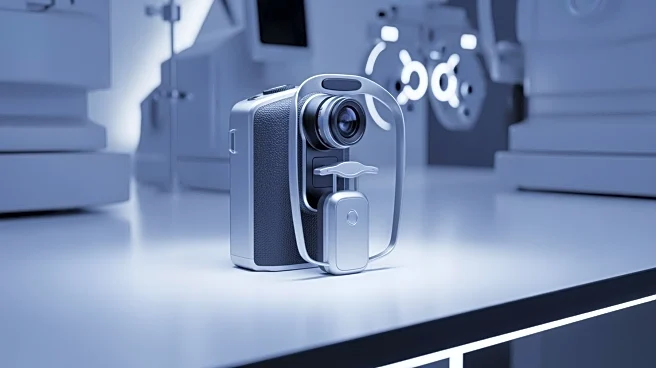What's Happening?
Professor Emmanuel Balogun from Ahmadu Bello University (ABU), Zaria, has led a study validating the Smart Eye Camera (SEC) as a cost-effective tool for preventing and treating blindness in Nigeria. Collaborating with scientists from Nigeria and Japan,
the study confirmed the SEC's effectiveness in replacing traditional slit-lamp microscopes for eye examinations. Published in the journal Eye, the research demonstrated the SEC's diagnostic accuracy of up to 96%, comparable to conventional methods. The device, developed by OUI Inc., Japan, is affordable and portable, making it suitable for rural areas with limited access to ophthalmologists. It supports telemedicine by transmitting images to specialists for review and offers cloud storage for data sharing.
Why It's Important?
The validation of the Smart Eye Camera represents a significant advancement in eye care, particularly in developing countries like Nigeria, where over 1.13 million people are blind. The device's affordability and portability make it accessible to underserved communities, potentially reducing preventable blindness. Globally, with over 1.2 billion people affected by visual impairment, the SEC could transform eye care delivery, especially in regions lacking medical infrastructure. The initiative positions Nigeria as a potential leader in eye-care technology manufacturing, fostering local production and economic growth.
What's Next?
Professor Balogun and his partners are seeking investment to establish local production of the Smart Eye Camera in Nigeria. This move aims to enhance the country's role in Africa's eye-care technology sector, potentially leading to job creation and technological innovation. The widespread adoption of the SEC could prompt further research and development in teleophthalmology, improving healthcare access and outcomes in remote areas.
Beyond the Headlines
The development and validation of the Smart Eye Camera highlight the importance of international collaboration in scientific research. It underscores the potential for technology to bridge healthcare gaps in developing nations, offering a model for similar innovations in other medical fields. The project also raises ethical considerations regarding equitable access to healthcare technology and the need for sustainable investment in local manufacturing.















